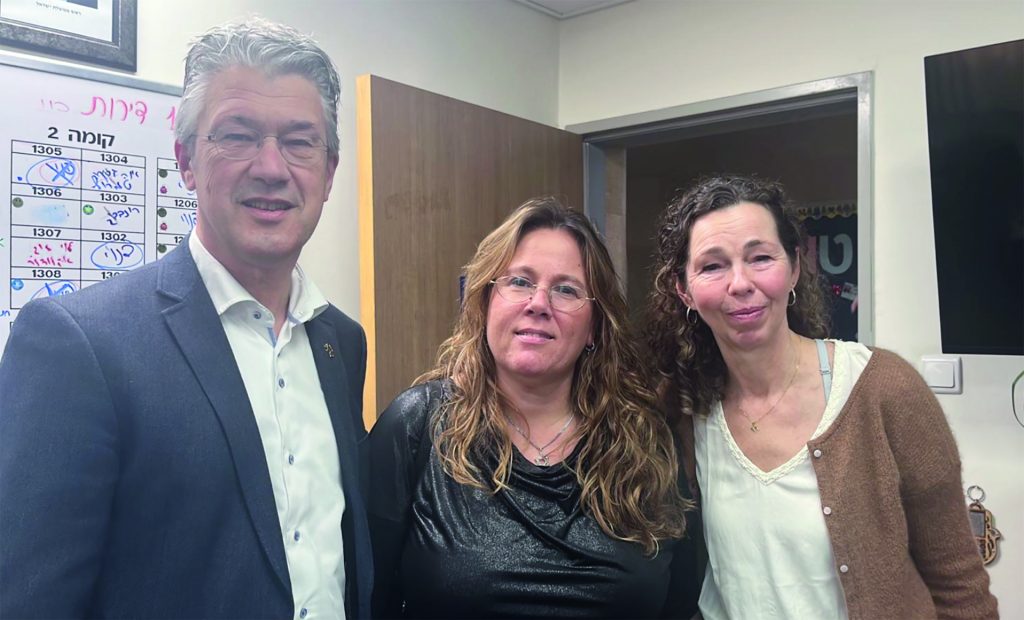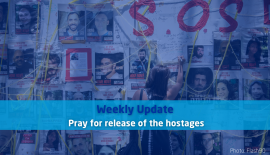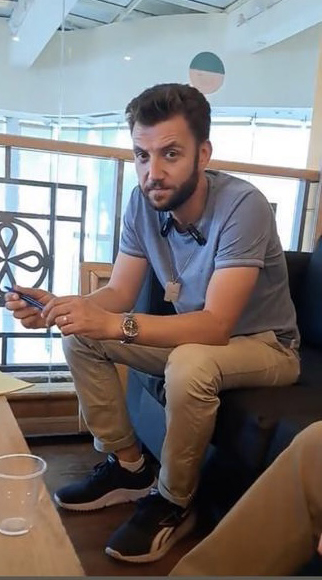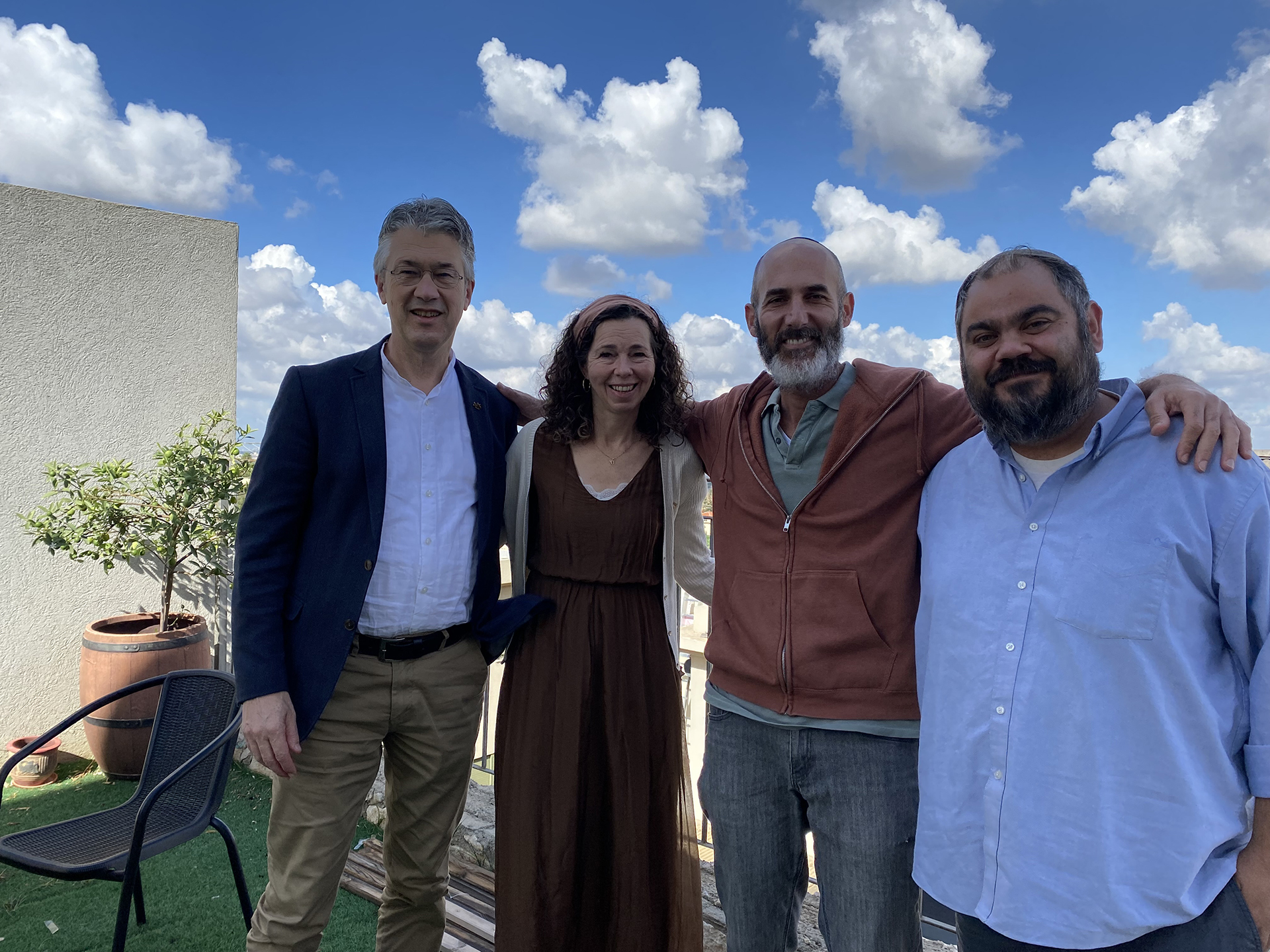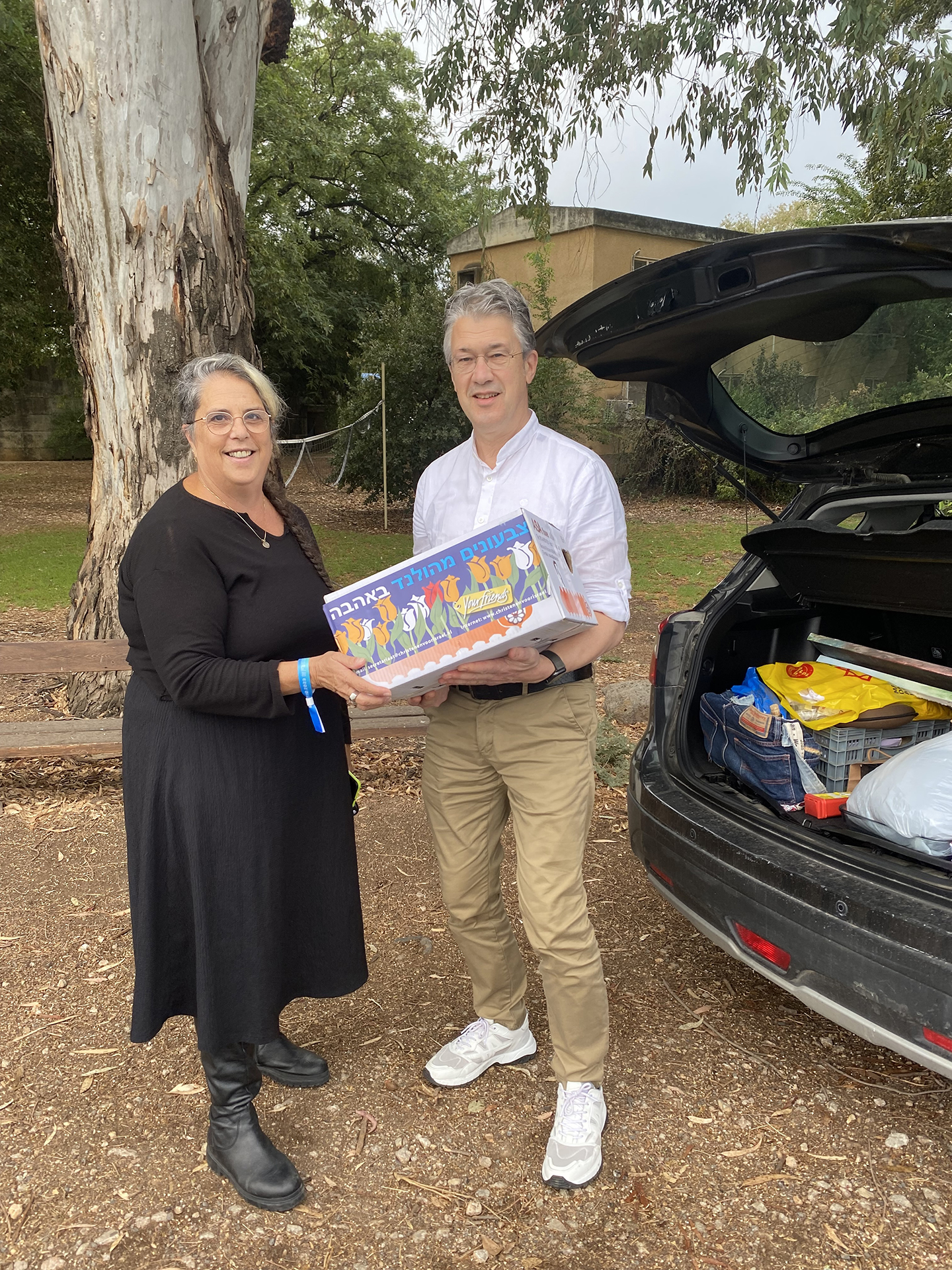Journey of Encouragement Leon & Janine Meijer
This week, C4I International chairman Leon Meijer and his wife Janine are in Israel to visit C4I projects and encourage the people of Israel. They lived in Israel from 1991-1999.
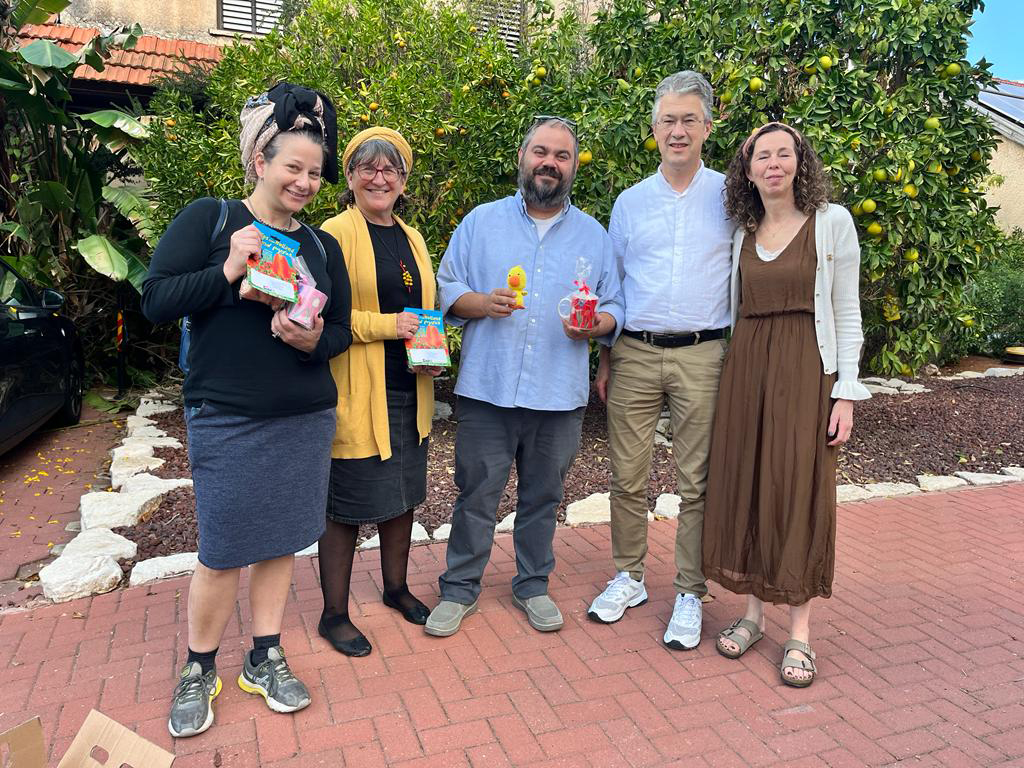
Leon and Janine during a visit to Christian Friends of Israeli Communities, with Sondra Oster Baras (in yellow) and Schmuel Junger (middle) | Photo: C4I International
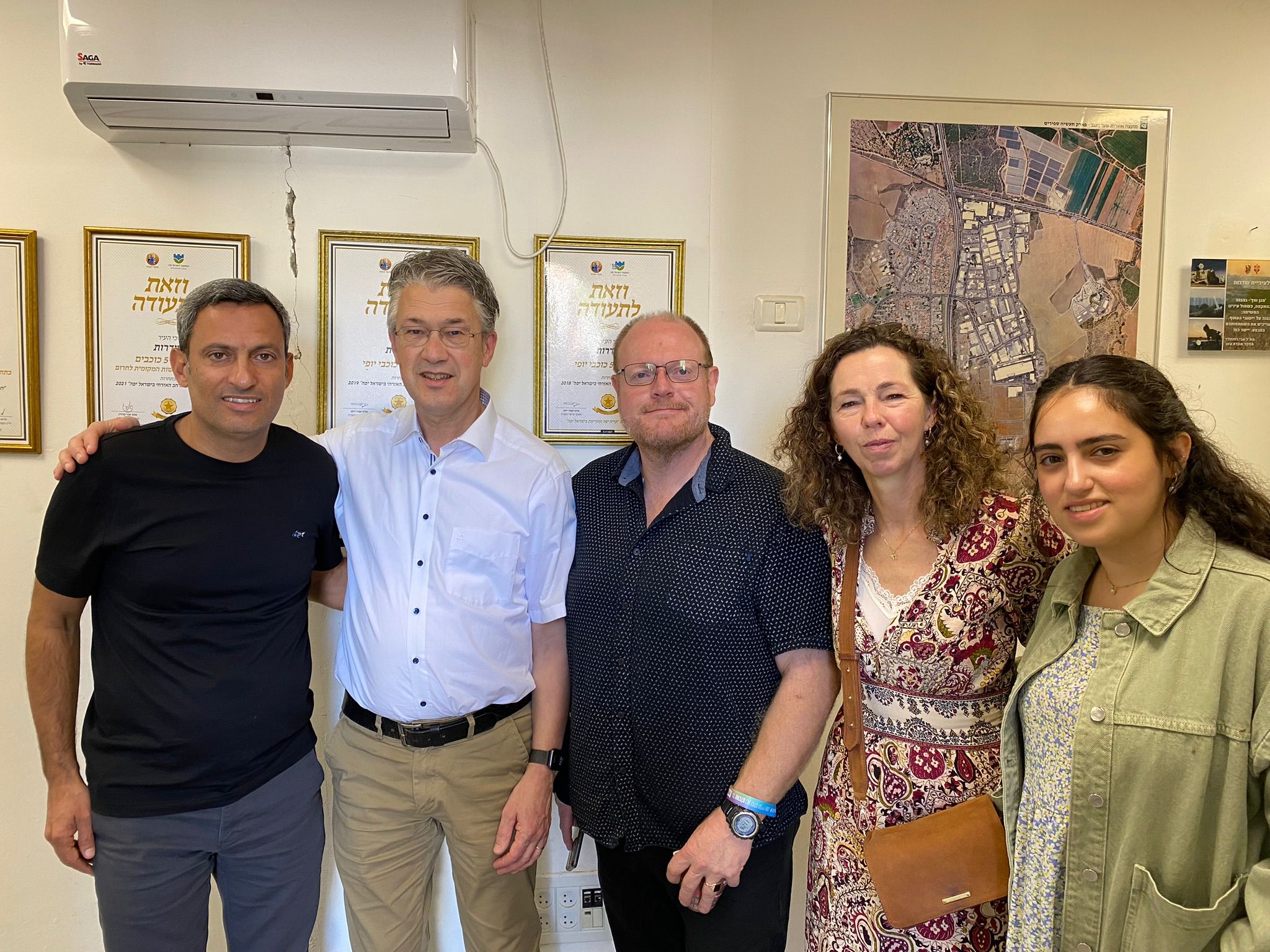
Leon and Janine with the mayor of Sderot (left), his daughter (right) and Bryce Turner (C4I New Zealand) (middle) | Photo: C4I International
Day 5 – 16 November
It is thirty degrees outside. We are at a spa in Ein Bokek and looking out over the Dead Sea. If you didn’t know better, you’d think we were on vacation. But the poignant story of Lothan, sitting next to me on the couch, makes you forget the surroundings immediately.
Lothan is a survivor of kibbutz Be’eri (near the Gaza Strip) and has been evacuated with his wife, three children and the other thousand residents of his community to the hotels in the Dead Sea area. On October 7, Lothan and his family hid in the secure room of their home for more than 20 hours. Meanwhile, he heard shooting and Arabs shouting near his house. The residents kept each other informed via Whatsapp messages ‘They are knocking on my door. They are smashing my window’. And so, Lothan unwittingly witnessed the murder of his in-laws, who also lived in Be’eri.
His mother-in-law, who kept the door of the secure room firmly shut, noticed that she wouldn’t survive and texted her children that she loved them. The Hamas terrorists taped explosives to the door of her room, blew it up and entered. ‘HELP, HELP’ were the last WhatsApp messages from her. Two days later, Israeli troops found her and her husband three hundred meters from the kibbutz with a bullet through their heads. Apparently, Hamas had wanted to take them to Gaza, but they were too wounded to walk the distance.
Lothan tells us that probably 300 to 400 terrorists had entered the kibbutz. For twenty hours, he and his family made as little noise as possible, no light. They didn’t have enough food and drinks in the safe room. When the army was finally able to free them, there were still terrorists in the kibbutz and corpses lying everywhere. The soldiers surrounding his family instructed him to keep his hands in front of his children’s eyes as they sneaked to the road where they could board a bus. Halfway there, they were still shot at, but fortunately one of the soldiers eliminated the intruder.
Meanwhile, Lothan and his family have been in the hotel by the Dead Sea for six weeks. When they arrived, there was a large amount of candy waiting for the children in the lobby. His children only grabbed healthy things and took them to their room. ‘Then we will have food when they come here too,’ they told their mother. Their youngest son asks his father to tie the doorknob with a towel at night. The first three days after October 7, he only whispered.
Day 4 – 15 November – No military operation, but war
I read an online Dutch newspaper, and it feels like I am in an other world. The news about Israel doesn’t represent the reality I am experiencing. It doesn’t seem to sink in that it’s not just about a ground operation. Israel is at war.
As we say goodbye to our host in the north, we meet the owner’s son. He just got home for the first time after four weeks in Gaza. He has a 7-month-old son and all this time he has only been able to make two phone calls. The soldiers don’t have their cell phones with them in Gaza. ‘What it’s like in Gaza? Violent, Hamas has brought devastation upon itself.’ He has only 24 hours with the family before he has to go back to Gaza.
Throughout the day, we keep running into relatives of soldiers. A pregnant woman tells us her husband is in Gaza as a soldier. A single mother shows us a picture of her only son: serving in Gaza as a soldier. A young woman tells us she is tense, her boyfriend is in Gaza as a soldier. Israel is at war and the whole society is involved. ‘We have to be strong,’ one of the mothers says, ‘because our army needs a strong people behind it.’ Along the way, we come across trucks carrying large blocks of concrete. When we look closer, we see they are mobile air raid shelters. My Dutch newspaper does not write about them, which leaves an image that a professional army is fighting a few thugs.
A monster
We meet Elad in Zufim, a Jewish village in Samaria that we reach through a checkpoint. The sun is shining, we sit outside. We can see Tel Aviv in the distance. It is quiet and peaceful around us, until Elad starts telling us about Avi’a, his 22-year-old daughter who went to a music festival on October 7. Over the course of that Saturday, like many Israelis, he receives word that all is wrong around Gaza. At first, the extent of Hamas’ attack does not penetrate. But when he can’t get in touch with his daughter, he decides to drive there. The army advises him against it because there are still terrorists roaming around.
Elad has been a professional soldier and was in a special unit. As a former soldier, he decides to go anyway. He cannot find her, but he sees the carnage that has been done. He hopes she has managed to escape, and her cell phone battery is dead, but the days pass without any news. He gives a DNA-sample to help the army with identification. Seven days later, some people from the Israeli army show up at his doorstep. They have identified his daughter; she was killed. Elad shows us pictures of a beautiful vibrant daughter. ‘I can’t look at it,’ he says. He points around him. ‘We can’t let this go.’ And he is referring to the land. ‘We thought the monster would keep quiet if it could fire missiles at us from time to time and we kept supplying them with food, water, fuel and medical materials. But we fooled ourselves. What country would allow neighboring countries to fire missiles at you? We almost began to consider it ‘normal’, and the world was not bothered by it either. But if we don’t stop and eradicate this now, then all our children will have died in vain, and it will happen again.’
Day 3 – 14 November – Survival mode
As we drive north, the GPS suddenly ‘dies’. We are on our way to Dafna, who wants to show us what life is like under the threat of rocket attacks.
Bunker
Dafna is an employee of the region around Kirjat Shmona on the border with Lebanon and Syria. We drive past military road closures, seeing mostly military vehicles along the way, and soldiers letting us pass. From previous visits we know the area a little and without navigation we still manage to find kibbutz Amir. The gate of the kibbutz opens, Dafna is waiting for us, and heavily armed middle-aged men show us the way to the reception area: a bunker. Up to five kilometers from the border with Lebanon, all residents have been evacuated. Kibbutz Amir is 5.2 kilometers from the border.
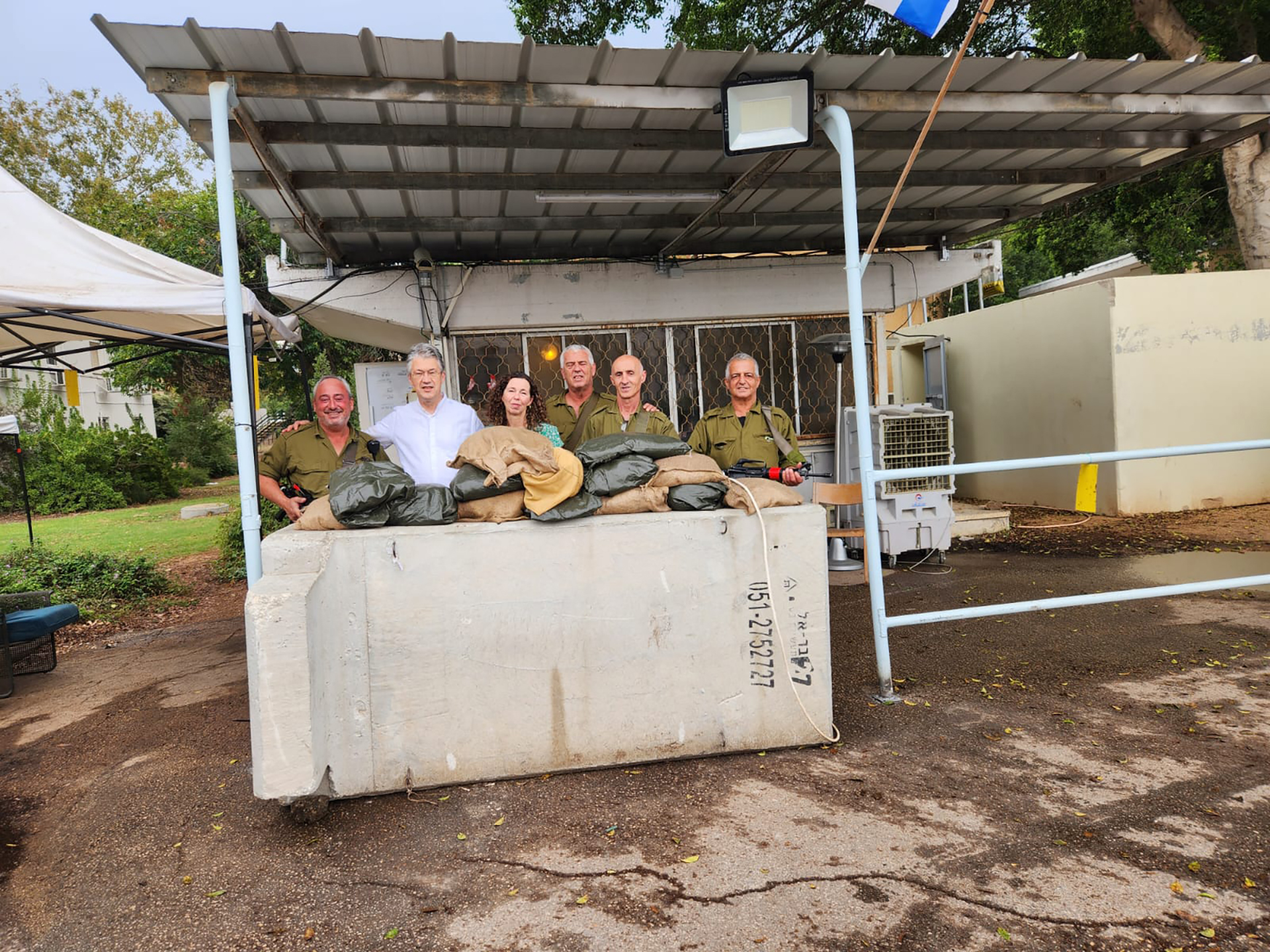
Loud bangs
Orit, Chaim, Barak and Eran explain to us what the first, second and third line are. Chaim is responsible for overall security. During our visit, he doesn’t lose sight of us, his M16 hanging loosely around his shoulder. What he does in daily life? ‘I was enjoying my retirement’. From the looks of it, he is a retiree who often visits the gym. During our visit we hear loud bangs, but Chaim reassures us. ‘That’s our artillery. If you live here, you can hear the difference when they shoot at us. Hezbollah shot at us a lot yesterday and we make it clear that that cannot go unpunished.’
Alert
Barak is part of the front line, guarding the village with other armed members of the kibbutz. ‘What happened in Gaza must not happen here. We are alert for infiltrators.’ Orit, the woman in the company, is in charge of the second line. ‘If a rocket comes down, we have to take care of the wounded as soon as possible. In the bunker, everything is ready for that.’ She has also arranged for a doctor to stay in the village. The others look at her in surprise. ‘Yes,’ she says, ‘I have found a volunteer, I have arranged a room and food for him.’
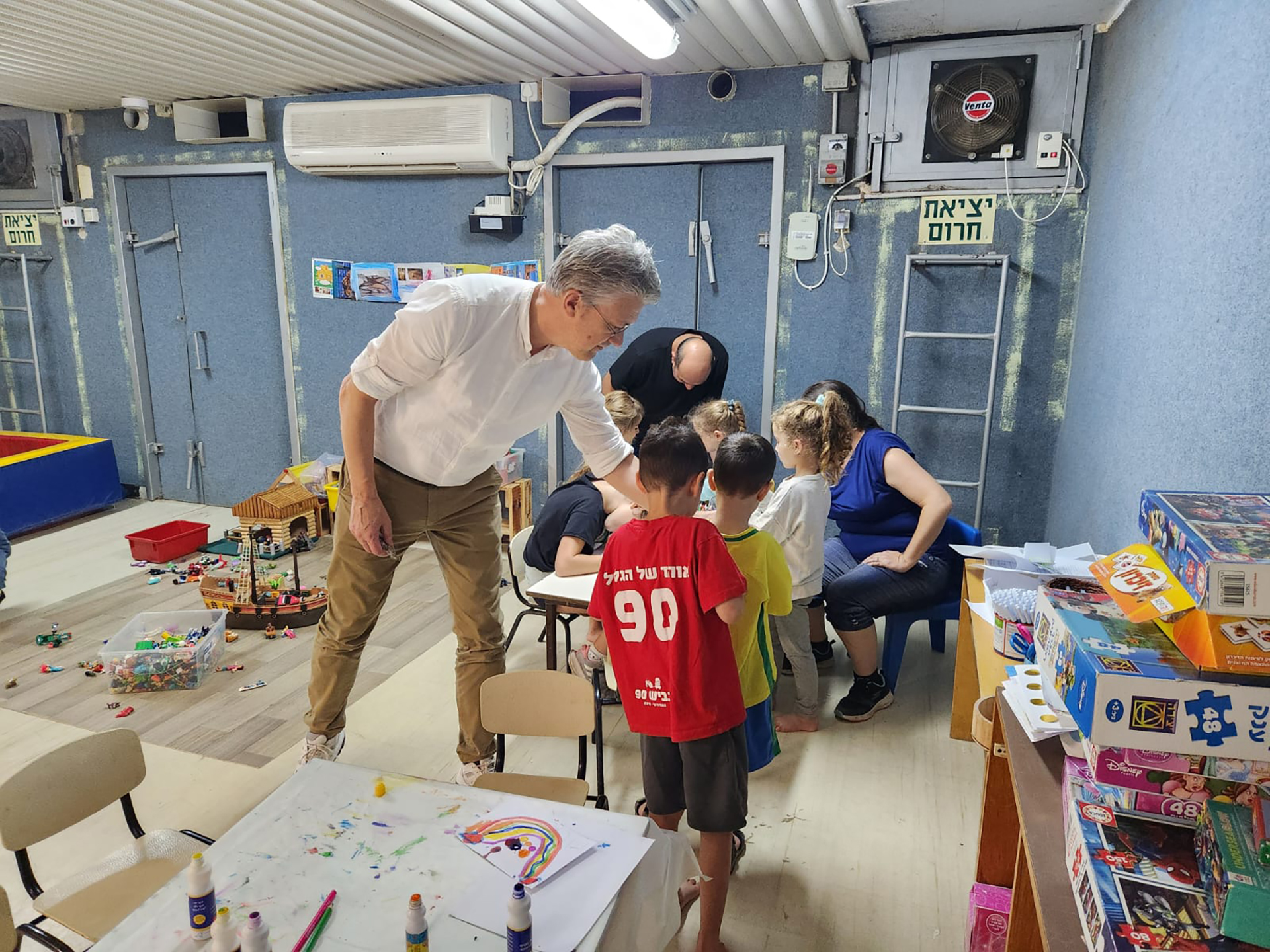
Daily routine
Eran is in charge of the third line. The residents of this kibbutz have not been evacuated, but it is not safe to take the children to school in other villages now, so each village organizes its own education, from primary to secondary school. He takes us to another underground bunker where elementary school groups 1, 2 and 3 are located. Eran explains that the children are offered as much daily routine as possible, although that routine does not allow them to play outside. Orit aptly sums it up: we are in survival mode, prepared for the worst. In a radio studio down the road, the staff thank us for coming. ‘It means so much to us, that you have come to see us in this difficult time.’ Not for the first time, tears well up in the eyes of the people we meet. In most countries people don’t realize Israel is not only fighting Hamas in Gaza, but the whole country is at war.
Day 2 – 13 November (2) – Survival mode
“A miracle, I have no other word for it”, Racheli says. She works for The Jewish Agency and is responsible for sheltering 600 recently immigrated Ethiopian Jews in Ibim, a kibbutz near Gaza. In their murderous march through the villages surrounding Gaza, the Hamas terrorists walked past Ibim. The Ethiopian Jews in Ibim were completely defenseless; none of them were armed. However, they did spend hours in shelters and heard much war violence around them. The rockets fired in large numbers were also for them.
On Monday October 9, while groups of terrorists were still roaming around, they were evacuated by buses. There was much fear and confusion. ‘We were running around pushing people into the buses. ‘Full? Drive! Just south of Haifa, in a large hotel, Racheli tells her story. The hotel houses 400 Ethiopian residents of kibbutz Ibim, nearly 300 of whom are children. The many children roam the hotel’s lobby and dining room. They do homework, play games and run around. Men and women are praying in the synagogue.
Sadness and horror
The team working with the Ethiopian immigrants is also staying at the hotel. They themselves are also from the south and have now been evacuated to this place. The sadness and horror can be heard in their stories and read from their eyes. Each of the four team members has lost family or friends. Their sons and daughters have been drafted into the military. Tears well up in Racheli’s eyes as she tells she will be able to briefly see her son that evening, who is in Gaza as a soldier. They are doing their best to support the residents of Ibim the best they can and try to accommodate the kibbutz residents as much as possible as a community, to maintain their bond.
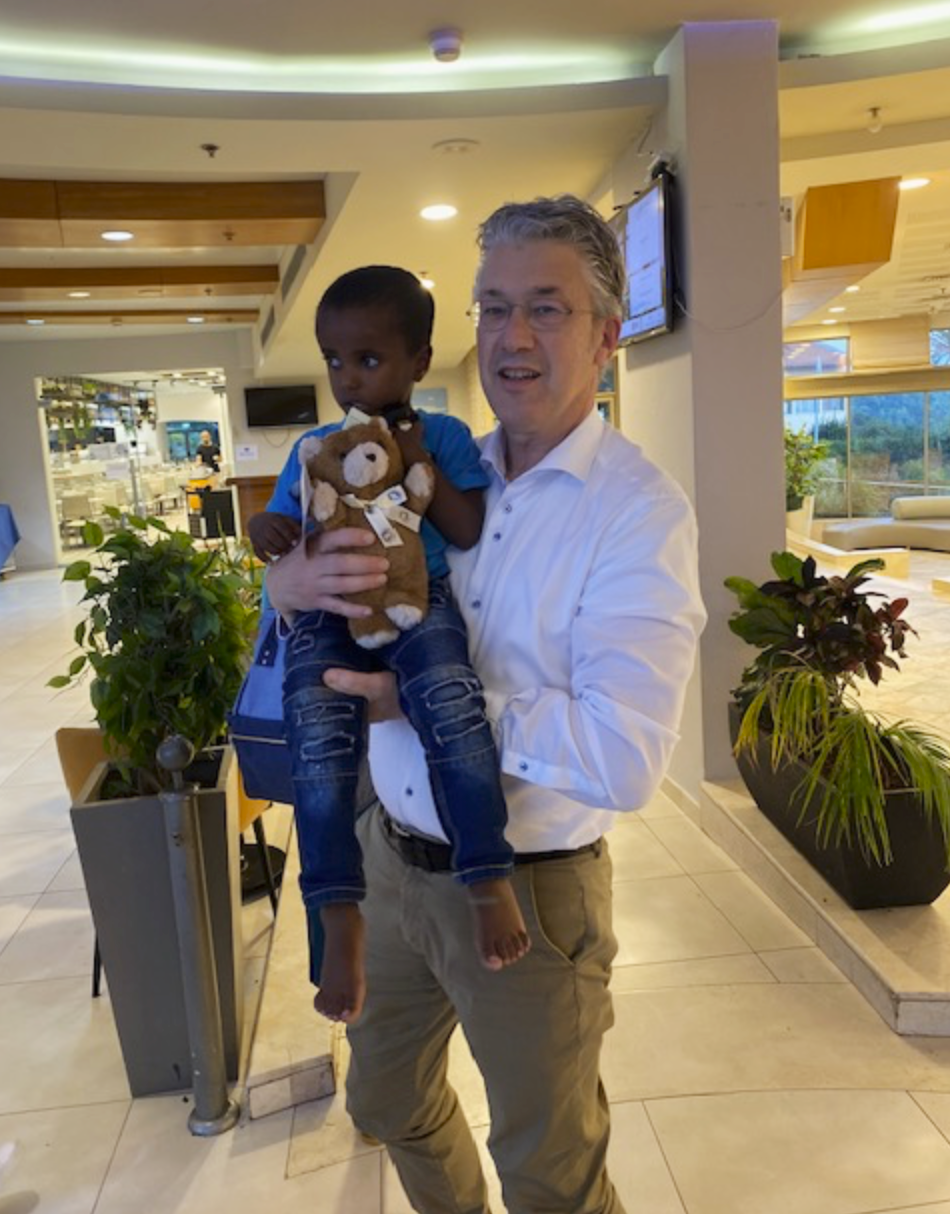
Antisemitism
‘How is it that people in Europe have so little understanding for us,’ Racheli asks. ‘That people take to the streets to demonstrate for the Palestinians and not for our 240 hostages and against the brutality with which they slaughtered our children and women. Does antisemitism go that deep? She swallows away her emotions. ‘Tell the world what you see here, how it really is.’ Racheli says they are holding strong and keeping morale high. ‘Our children and our soldiers are fighting to preserve Israel, and they need a strong people. There is trauma, a lot of trauma, but right now, we have to be strong and keep going.’ The trauma is there and will be released after the war. People have experienced different things, but trauma is there for every Jewish resident.
Russian roulette
The residents of kibbutz Nachal Oz, which borders the Gaza Strip, are divided into two places. One in the south and another part in a kibbutz in the north. We visit the kibbutz in the north. Raymond tells us 7 October was like Russian roulette. One house they invaded and killed everyone, the other house they skipped. He himself sat with his wife Mirjam and three children in the shelter of their house for 17 hours. After the Hamas terrorists, the ordinary residents of Gaza came to loot. Anything that was loose, they took, and if the TV, for example, was fixed to the wall, they smashed it. Wherever they could, they kidnapped men, women and children, because Hamas lavished money on them.
After 20 hours, the army was able to unseat and evacuate the people in the kibbutz. Some people arrived in the north barefoot, as all shoes had been stolen. ‘I always told visitors that 20 percent of the people in Gaza were part of Hamas, but 80 percent of the people just wanted peace. I can’t tell that story anymore, it wasn’t true,’ Mirjam says.
Moving again
The residents of Nachal Oz have just been told that they cannot return to the kibbutz for at least a year. They are looking for a new place to accommodate this community. The situation with one room per family and a common living room and kitchen is temporary. For this community, it means another move and another school for the children.
Day 2 – Monday 13 November (1) – Fighter planes overhead
‘Do you have the radio on’, a concerned Israeli friend asks when calling. We are on our way to Karmiel, a town in northern Israel fifteen kilometers from the border with Lebanon. ‘Hezbollah is firing rockets, check Red Alert.’ Red Alert is an app that alerts you if you need to take cover from rockets. The app does indeed indicate that rockets are coming down in the north, but not (yet) in Karmiel. With the app on our cell phones, we drive on to Karmiel.
New immigrants
The police check all vehicles entering the city. At the reception center for new immigrants, 90 young people from Russia, Ukraine, Uzbekistan and Kazakhstan sit outside under a tent canvas. And although public gatherings are prohibited for security reasons, the mayor has allowed this gathering. The young people arrived on October 12, and today their language school starts. Some have gone from one war to another. The young people have come alone, without parents, to build their lives here. ‘Israel is our country, and we are glad you have come home’, the head of the school tells the students. ‘You have come at a very difficult time. We have sorrow and pain for what has happened in the villages around Gaza. But none of this pain prevents us from believing that this is our home. The pain will not break us; this remains our home.’
Tough period
Moshe Kaminsky, the mayor, also addresses the young people. Karmiel, too, is mourning. Not only were seven soldiers from the city killed, but also 10 young people who were at the music festival. ‘This is a tough period, but through all the tough periods, Jews have continued to return to the land of their ancestors. And that gives us hope, including your choice to come now.
Balloons
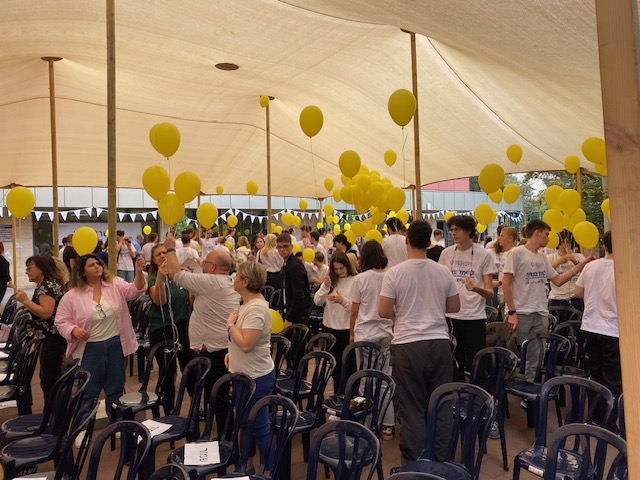
When Leon is given the floor, he talks about the God of Abraham, David and Solomon. The people have been going through good times and hard times for three thousand years. And the God who stood by Abraham and King David is also the God who stands by Sasha and Nastiya today, names of random Jewish immigrants from Russia and Ukraine. Together with young people, we release balloons for the 240 hostages in Gaza; a music group sings ‘Bring them home’. And all the while we hear the hum of fighter jets overhead.
Day 1 – Sunday 12 November – Welcome home
Although the EL AL flight from Amsterdam to Tel Aviv was supposed to leave on time, it was still delayed. It is quiet around us. A remarkable number of families with babies are returning to a country at war.
The lady sitting next to us is surprised that we are going to Israel. When we ask why she is not staying in the Netherlands, she says: “In Israel I can speak Hebrew, and no one looks at me threateningly. I can have a necklace with a Star of David around my neck, and I don’t have to be afraid that someone will say something about it. You can’t do that in the Netherlands. There is only one country where Jews can be Jews.”
We fly via a different route to Ben Gurion Airport. ‘If a rocket is shot off now, we have a serious problem”, my neighbor says encouragingly. Because of this route, the plane has time to turn around if there are rockets coming from Gaza. When we land, the flight attendant welcomes everyone to the ground, saying in Hebrew something she leaves out in English. She adds a prayer for peace for the country and safety for the Israeli soldiers and concludes her words with “Am Israel Chai,” the people of Israel live.
The airport is quiet and peaceful. There are signs everywhere pointing to the nearest bomb shelter. In the long hall toward passport control we see the photos of the more than 230 Israelis taken hostage. They are not forgotten by Israel. Standing in line for passport control, we have to come with a security officer for questioning. They want to know why we have come and where we are going. “To be with friends in their time of need”, is enough to be granted entry.
We rent a car and head north. On the matrix signs that normally show the maximum speed, we now see the Israeli flag. When we arrive at our friends’ house, we are hugged tightly. We hear stories about people they know and have been taken hostage, and stories about their children currently serving in the army. They check to make sure we have the right app on our cell phone that displays the air alert. It is four weeks after 7 October, and the scale of the brutal massacre of 1,200 Israelis has shocked Israel to the core. This was not just another attack, like one of many in recent years. The country is at war and everyone we meet so far speaks of it that way.
Many people are in the military, and everyone who is not in the military is working very hard to keep the economy going. My friend is on the phone with foreign customers every day. His company operates in 60 countries. Some customers are worried about whether to buy the Israeli technology. My friend expects a boycott of Israeli products. His wife agrees. “We refuse to be victims, and the world can’t seem to accept that.”
Late in the evening, we get a message from another friend. “Are you in Israel? After a positive response we receive the touching message ‘Welcome home’.
